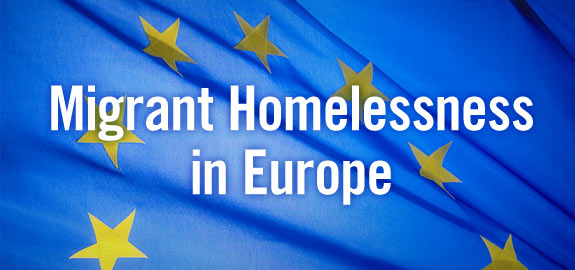An important aspect of membership for the countries that make up the European Union (EU) is that a citizen from any EU country can enter, live, and work in another EU country. However, policies toward people experiencing homelessness vary widely across the EU’s 27 nations. Some countries refuse access to even basic social services for destitute people who migrate from other EU countries and experience homelessness. Mauro Striano, migration policy officer for the European Federation of National Organizations Working with the Homeless (FEANTSA) explains the issue to Richard Schweid.

There are two important aspects of membership in the European Union (EU). Citizens of its 27 member countries both share a currency and have the right to live and work in any EU nation. In fact, one of the cornerstones of the EU is this “parity” among countries. A citizen from any EU country can enter, live, and work in any other EU country. This person will have the same rights as a national. However, some EU countries ignore the lofty ideal that all Europeans are equal when it comes to migrants who are homeless.
Policies toward people experiencing homelessness vary widely in EU nations. Some countries refuse access to even basic social services for those destitute people who migrate from other EU countries and become homeless.
In Denmark, for instance, public shelters and any other homeless services deny access to unhoused non-nationals. In December 2010, a privately funded shelter called A Warm Bed was the target of a police raid. The shelter was operated in Copenhagen for non-Danish people without housing. Sixty-nine non-Danish people were arrested, most of them EU citizens.
Yet, other countries do not have such restrictions. “On the other side are countries like Austria where there is no problem for non-nationals to access services,” said Mauro Striano. Mr. Striano is an Italian national who is migration policy officer for the European Federation of National Organizations Working with the Homeless http://www.feantsa.org (FEANTSA) in Brussels. “There are countries with a history of immigration because of a colonial past or labor migration. For others, immigration is a new phenomenon, so the responses can be very different.”
He continues, “In London, something like fifty percent of people who are homeless are from Eastern European EU member countries. In Stockholm, some fifty percent of people [who are homeless] are from Finland. These people are migrants, but they are EU citizens. They are normally entitled to a certain degree of rights and services. Sometimes these things are not being granted.”
In a policy statement issued in February 2011, FEANTSA called on the EU to ensure legally that no EU citizen will wind up without shelter in an EU country. The statement reads, “While it is understandable that Member States want to prevent people from abusing their social security system, this must not be used as an argument to prevent basic services, such as emergency shelters, for EU citizens that have exercised their right to free movement…”
So far, there is no movement toward such a goal at the EU level, according to Mr. Striano. At the national level, tough economic times and a scarcity of resources impede progress. In a number of countries, high unemployment foments resentment toward those who migrate from other countries—EU or non-EU—looking for work. Nevertheless, the elimination of street homelessness by 2015 is an EU goal. To achieve it, the unequal access to homeless services experienced by migrants will require resolution.
A portion of the migrant homeless population consists of refugees or asylum seekers. Provisions exist in most EU countries to differentiate refugees and asylum seekers (who migrate in search of protection from persecution), from economic migrants (who cross borders in search of better job opportunities). Nevertheless, in various EU countries, refugees and asylum seekers may also find themselves without recourse to emergency shelter. In Brussels, for example, the capital of the EU, refugees receive shelter for 2 months in a reception center. After that, they are on their own. However, the law says that a person must have a fixed address in order to access social benefits. Because of housing discrimination and lack of economic means, many refugees are unable to find housing within 2 months. The result is that many people experience homelessness while waiting to hear about their status.
In order to begin addressing migrant homelessness, Mr. Striano says that the EU needs to create a legal framework. “All migrants, regardless of legal status, can access emergency health care. The same logic should apply for access to emergency accommodation. During winter, people who are homeless can die. This needs to be regulated at the European level. We need minimum requirements for accessing emergency accommodation.”
Over the past 2 years, the EU has debated the integration of migrants. “Integration policies need to be connected to access to social benefits and housing,” notes Mr. Striano. “These policies need to address issues of social inclusion for immigrants in the long term as well as the short term.”
Some public entities are not waiting for EU legislation. For instance, the City Council in Paris is developing policies to facilitate integration of migrants and avoid homelessness among their ranks. Olga Trostiansky, deputy mayor of Paris, explained the effort in an article in the summer 2010 issue of FEANTSA’s quarterly, Homeless in Europe. “Making a clear-cut separation between illegal immigrants to be hunted down and deported, and legal immigrants to be integrated, is mainly political rhetoric, disconnected with the practical realities,” she wrote. “In most cases, they are the same people at different administrative stages of their migration pathways. “
She concludes, “By ensuring the right to come and go freely for its citizens, promoting access to housing or, failing that, social housing, increasing access to services provided by the Paris authorities, Paris City Hall is striving to guarantee everyone a right to the city and right of citizenship.”
